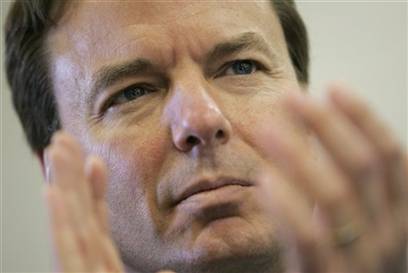John Edwards’ Iraq Pullout Plan
 John Edwards called yesterday for an withdrawal of American trainers from Iraq as part of a near-total withdrawal by next fall.
John Edwards called yesterday for an withdrawal of American trainers from Iraq as part of a near-total withdrawal by next fall.
John Edwards says that if elected president he would withdraw the American troops who are training the Iraqi army and police as part of a broader plan to remove virtually all American forces within 10 months.
Mr. Edwards, the former senator from North Carolina who is waging a populist campaign for the Democratic nomination, said that extending the American training effort in Iraq into the next presidency would require the deployment of tens of thousands of troops to provide logistical support and protect the advisers. “To me, that is a continuation of the occupation of Iraq,” he said in a 40-minute interview on Sunday aboard his campaign bus as it rumbled through western Iowa.
[…]
Mr. Edwards’s plan calls for immediately withdrawing 40,000 to 50,000 troops. Nearly all of the remaining American troops would be removed within 9 or 10 months. The only force that would remain would be a 3,500-to-5,000-strong contingent that would protect the American Embassy and possibly humanitarian workers.
It should be noted that Edwards would continue some level of training of Iraqi forces outside the country, although even he acknowledges that this would be of very limited value.
As Michael Gordon, who wrote the above report, points out, this plan is not only a marked departure from Edwards’ previous positions but is in marked contrast with expert recommendations.
American military commanders have publicly cautioned that a rapid withdrawal of troops risks a new escalation of sectarian violence, which has been substantially reduced in recent months. A National Intelligence Estimate on Iraq that was issued in January 2007 by the United States intelligence agencies also warned that the withdrawal of American troops over the ensuing 12 to 18 months would probably lead to “massive civilian casualties and forced population displacement.”
Mr. Edwards acknowledged that there was a risk that a speedy troop drawdown might lead to substantially increased sectarian violence. Under Mr. Edwards’s plan, the United States would keep a quick reaction force in Kuwait and perhaps Jordan to respond to terrorist threats and possible “genocide.”
That Edwards’ views have evolved over the nearly five years we’ve been in Iraq is hardly damning. His contention that the Iraqi government is making little to no progress in solving internecine disputes and building civil society is uncontested. Whether withdrawing in an attempt to shock them into action would be any more effective in that regard than the Surge is hard to say, really; certainly, nothing has worked so far.
Still, it’s hard to imagine that removing a professional security force from the country would help reduce violence. And harder still to imagine a situation wherein a president has removed troops from a situation, sees a marked increase in sectarian violence, and decides to redeploy them into harm’s way. Once we’re out of Iraq, one imagines we’re out for good.
For that matter, if stopping an ongoing Iraqi genocide would be worth risking substantial American combat casualties, why isn’t it worth keeping troops there to prevent it from happening in the first place?
Photo credit: AP/MSNBC
In the short term, true. In the long term, false.
Iraq is hopeless. There’s just nothing there to keep it together as a state, except our troops, and a lot there that is tearing it apart. It needs to come apart. There can be no progress until it does.
And, yes, that process is going to suck. no doubt about that at all.
But it has to happen. All we do now is prevent the inevitable. And in the meantime a lot of people die (even with the influence of the surge, more than 400 civilians are killed every month in Iraq).
Since the US mission in Iraq is clearly mandated by United Nations resolution and the request of the host country, this makes John Edwards a cowboy with a “go it alone” foreign policy.
heh